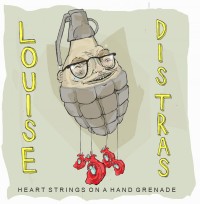Louise Distras hails from the grim North of England (this clichéd view firmly tongue-in-cheek), more specifically a place called Wakefield. Now, one of the only things I know about Wakefield is that it has a rugby league team called Wakefield Trinity, a name that I've been aware of for more years than I care to remember, and in my earlier years sounded quite exotic. However, that has now been usurped by the appearance of the gritty charms of Louise Distras and this, her second EP which has taken over as the main reason to be aware of the town that apparently lacks the exotic quality I once foolishly bestowed upon it.
Through her own admission, Distras is influenced by one man's approach of folk punk, Frank Turner, who in taking on and conquering many parts of the world has left in his wake a plethora of young upstarts following his lead. The obvious outcome of such a following means that there are the good, the bad and the downright ugly in respect to those trying to hit the right note with a solo career. Louise Distras, with an effective minimalist approach and a soulful vocal ability that swings between sweet and gravelly in the blink of an eye, comes into a category of her own, as this is clearly beyond plain old "good."
This EP provides three tracks of what is both mournful and ebullient sounding music, with Distras's vocals managing to convey a range of emotions with ease. The lyrics are full of imagery that one can associate with not only the aforementioned grimness of the North, but also most other towns and cities around the UK. Certainly with the last track, "Black and Blue", this message comes across as Distras sings "This town will never change, it will beat you black and blue," and many of us see that attitudes and cultures will remain firmly entrenched in our own habitat, either through a fear of change or just a sheer stubbornness to accept anything other than the norm.
"Black and Blue" builds to a wonderful group chorus which has quite an uplifting feel to it despite the nature of the lyrics and message that it contains, showing that Distras has a wonderful ability to write songs that contain an element of optimism, even just through the feel of the song, at odds with the words. Add to this the whistling in the song and you get a result that reminds me a bit of Noah and the Whale, who are currently quite popular here in the UK. I'd say this is the strongest song on the EP, although only by a whisker.
Apparently Louise Distras has been likened to Brody Dalle and Courtney Love (depending on the colour of her hair at the time it would seem!) but it won't be long before other solo performers are being compared to her, as she blazes a trail of folk punk across the UK. She will, in the process, be showing that solo female performers need not be like those found in the charts, who seem distinctly vacuous in comparison to (the black or blonde-haired–who cares?) herself.
I'd like to add that at times, listening to these three songs I am reminded of a young man from Barking who once ploughed a furrow for singer-songwriters whilst singing socially aware songs: Billy Bragg. Vocally, there are similarities between Distras (more on "Bullet") and Bragg in his early years as she is able to get quite a rough sound out at times (and that is a compliment). This is a top-class EP and Wakefield has something to be proud of in Louise Distras.
